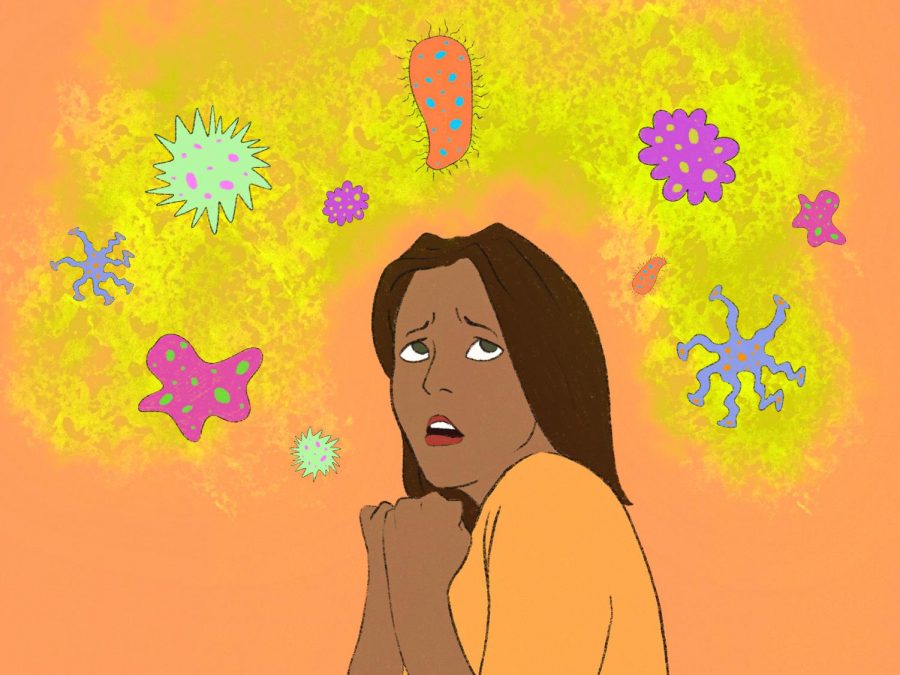Ill effects of illness
Withdrawing from social life out of fear of becoming sick is not the answer
We are now in a position where life can somewhat resume as we once knew it. However, some are not ready for the return.
November 8, 2021
I want to preface my words by saying I am not an anti-masker, anti-vaxxer or a COVID-19 denier. The pandemic is still going on, and until it reaches endemic levels, it is important to keep safety in mind.
On one hand, the COVID-19 pandemic has had a positive effect on our perspective of health. Whereas people used to send children to school even if they threw up, they now rightfully let their children stay home if they are feeling unwell. People who used to voluntarily wear masks are no longer outcasts in society.
On the other hand, there are negatives that should be acknowledged. I have seen people say they will never again shake someone’s hand, hug someone, dine in a restaurant or share food with people. These are vows people are making for the rest of their lives, even if COVID-19 becomes a miniscule threat.
This is because they are not just concerned about COVID-19, but germs in their entirety.
These vows – and overall change in mindset — can be categorized under the term “aversion.” Aversion to socializing. Aversion to going out in public. Aversion to living life.
This is not true for everyone, of course. You would be able to conclude that from the amount of parties on campus every weekend.
But aversion mindsets are true for a fair number of people, which is why I want to address the topic. Whether these aversions are rooted in fear or distaste, it is a worthwhile concern.
As someone whose entire angle is commenting on social interactions and calling on society to improve them in my columns, seeing people who wish to withdraw from society because of public health is a concern of mine.
I am not saying we should rush out there and get sick. However, is a healthy life worth abandoning social interactions?
Grace Covarrubias, senior computer science major, said she is moderately cautious in terms of health. Following the pandemic, she has become more cautious with health.
She said she does not believe that society has become overcautious with health.
“I think in the modern age, falling ill isn’t something we should have to accept as common,” Covarrubias said. “There are small changes that we as a society can make that can protect not just at-risk groups, but [everyone] else as well.”
She said it is our responsibility to take protecting others more seriously. To her, people staying home even with a mild illness is a societal improvement.
Sophomore astrophysics major, Mitchell Williamson, said he considers himself to be pretty cautious in terms of health. However, he said he does not believe he is cautious to an obsessive degree.
Williamson said he understands the current health practices because the pandemic is a matter of being safe rather than sorry. However, he does not believe they should persist forever.
“If distancing practices and the encouragement of staying home when ill continue as COVID becomes endemic … at that point I think it’d be considered overcautious,” he said. “Although reasonable as we don’t want COVID to rise up and become a global pandemic again, if it’s no longer a major issue, I don’t think it would need to be treated as such.”
Williamson said there is no such thing as being “too scared” in regards to public health because it is our responsibility to take care of others.
I wholeheartedly agree that we do need to protect others when it comes to health. That is why for many years, we have been encouraged to wash our hands, cover our face when sneezing or coughing and avoid touching others when sick. These practices have been around for years and I do not expect them to change.
I believe despite the aversions that arise, human interactions should persist. It should be okay to shake hands with someone or exchange a hug as long as both parties are healthy during the moment.
We should not avoid people just because there is a chance we might catch something. After all, the chances of getting sick with any infection are never zero.
But the chances of becoming mentally unhealthy because you choose to isolate yourself high.










